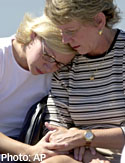Dealing with the Aftermath

During this time of crisis, we turn to Dr. Clarissa Pinkola Estes. A poet, author, and psychoanalyst, Dr. Estes works with the students of Columbine High School to deal with the tragedy that struck their community in 1999. She advises America to recognize the normal reactions that we may have after such devastation.
Normal Reaction to Loss, Injury and CatastrophePhysical reactions: fatigue, inability to sleep, sleeping too much, exhaustion, changes in appetite, digestive disturbances, feeling numb, crying, need for comfort.
Behavioral reactions: hyperactivity, poor concentration, inability to attach importance to anything but this event, flashbacks, nightmares, recurring dreams, inability to remember, refusing to talk, feeling one should not cry, startled reactions while awake or asleep, wanting to be alone, wanting to just sit or just stare.
Psychological reactions: feelings of fear, guilt or helplessness; feeling one cannot stop crying; anger, which may cause outbursts and the blaming of others; frustration with rescue workers, the bureaucracy, anyone who tries to help; violent fantasies; anxiety; depression; amnesia; thinking no one can ever understand, no one can ever help; blaming oneself.
These are normal reactions and, although painful, are parts of the healing process. There's not a lot anyone can do to make you not experience these feelings, but they will recede if you will take the following actions.
Actions to Take for Recovery
- Within the first 24 to 48 hours, do strenuous exercise coupled with relaxation. This will alleviate some of the physical reactions. Keep busy; do not sit and do nothing.
- Don't tell yourself that you have lost your mind. Talk to people—talking is the most healing thing you can do. Talk it out.
- You may have to tell your story over and over before it loses much of its pain. Each time you tell your story and receive someone's caring, you will be healing yourself. Try not to cover up your feelings by withdrawing or by using alcohol.
- Reach out to others. They really do care. Spend time with others. Do not isolate yourself. Ask other people how they are doing. Remember, they may be hesitant to tell their story to a stranger.
- Find things to do that feel rewarding or refreshing. When you feel bad, find a person to talk to and cry with, to tell of your anger and other helpless feelings.
- Your spiritual beliefs will definitely help you through. You will be able to help yourself and others better if you cleanse your feelings and accept caring from others.
© 1999 Dr. Clarissa Pinkola Estes, author of the
book Women Who Run with the Wolves



